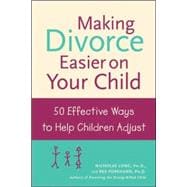
Note: Supplemental materials are not guaranteed with Rental or Used book purchases.
Purchase Benefits
What is included with this book?
Nicholas Long, Ph.D., is a pediatrics professor and the director of pediatric psychology at the University of Arkansas Medical School and Arkansas Children's Hospital. He is also the director of the Center for Effective Parenting, which conducts seminars and workshops for parents and professionals. He is a noted public speaker and researcher, is frequently quoted in national parenting publications, and has appeared on many local television and radio programs.
Rex Forehand, Ph.D., is Regents professor of clinical psychology and the director of the Institute for Behavioral Research at the University of Georgia. He is one of the most frequently cited authors in psychology and has been identified by his peers as one of the leading child psychologists in the United States. He presents workshops around the United States, as well as in countries such as Canada, New Zealand, and Australia.
| Preface | xvii | ||||
| Introduction | 1 | (14) | |||
| Part 1 Planning the Divorce and Telling Your Child | |||||
|
15 | (5) | |||
|
20 | (3) | |||
|
23 | (5) | |||
|
28 | (4) | |||
|
32 | (5) | |||
| Part 2 Looking After Your Own Well-Being During and Following Divorce | |||||
|
37 | (4) | |||
|
41 | (3) | |||
|
44 | (4) | |||
|
48 | (7) | |||
| Part 3 Issues Between you and Your Ex-Spouse During and Following Divorce | |||||
|
55 | (4) | |||
|
59 | (5) | |||
|
64 | (3) | |||
|
67 | (3) | |||
|
70 | (2) | |||
|
72 | (3) | |||
|
75 | (8) | |||
| Part 4 Visitation Issues | |||||
|
83 | (3) | |||
|
86 | (5) | |||
|
91 | (4) | |||
|
95 | (6) | |||
| Part 5 Divorced Parenting: General Guidelines | |||||
|
101 | (3) | |||
|
104 | (3) | |||
|
107 | (3) | |||
|
110 | (5) | |||
|
115 | (3) | |||
|
118 | (5) | |||
|
123 | (4) | |||
|
127 | (3) | |||
|
130 | (3) | |||
|
133 | (3) | |||
|
136 | (4) | |||
|
140 | (3) | |||
|
143 | (4) | |||
|
147 | (3) | |||
|
150 | (3) | |||
|
153 | (2) | |||
|
155 | (2) | |||
|
157 | (2) | |||
|
159 | (3) | |||
|
162 | (2) | |||
|
164 | (3) | |||
|
167 | (2) | |||
|
169 | (4) | |||
| Part 6 The Importance of Other Relationships | |||||
|
173 | (2) | |||
|
175 | (5) | |||
|
180 | (3) | |||
|
183 | (3) | |||
|
186 | (5) | |||
| Part 7 Seeking Professional Help | |||||
|
191 | (8) | |||
| Part 8 Moving Toward the Future | |||||
|
199 | (2) | |||
| Bibliography | 201 | (8) | |||
| Resources | 209 | (14) | |||
| Index | 223 |
The New copy of this book will include any supplemental materials advertised. Please check the title of the book to determine if it should include any access cards, study guides, lab manuals, CDs, etc.
The Used, Rental and eBook copies of this book are not guaranteed to include any supplemental materials. Typically, only the book itself is included. This is true even if the title states it includes any access cards, study guides, lab manuals, CDs, etc.